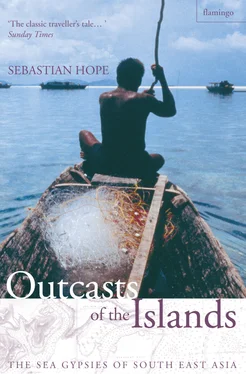Leaving sewerage to nature is all well and good whilst the concentration of effluent-producers remains low. Garbage disposal is equally simple if the packaging is biodegradable – rattan and woven palm-frond baskets, banana leaves and coconut fibre string, containing foods clad in skins, scales, peels, rinds, husks, shells. Introduce plastic into the equation and trouble is not far away. As we shuffled with the crowd past dry-goods stalls, selling slabs of cassava sealed in plastic, sugar, rice and tea at pre-measured weights in plastic bags, the sweets and snacks, the pills and cigarettes, all wrapped in plastic, all waiting to be carried off in a black-blue-white-pink stripy plastic carrier bag, it depressed me to think that much of it would end up in the sea.
The café’s television was already on, loud. It was at the far end of the room, but where Sarani and I sat, at the back, near the door, was not a quiet spot. The sound was quadraphonic, the set vast; they were showing a beat-’em-up movie on laser disc player. To think that a lad from, say, Pulau Tiga, an island with two papaya trees and a volleyball net, could come to Semporna and watch phoney American kung-fu films on laser disc, in a kedai on stilts that felt as unsteady as a tree-house and shook every time a boy-porter trundled his blue wheelbarrow along the sun-lit walkway the other side of the wall from our table, toting jerrycans of fuel, sacks of salt, that I was sitting here watching extravagant fight scenes, more blows to the head than a skull could take, and the pugilists getting up to crack more ribs, to extract more gut-wrenched groans, in quadraphony, that I was watching with an old man who had two teeth and lived on the sea – I was in a state of culture shock for a moment.
A man in a songkok put his head round the door and greeted Sarani in Sama, ‘ Magsukur , Panglima,’ shook his hand, touched his own to his heart. ‘Good morning,’ he said to me in English. He sat down at our table, and studied me carefully, my hair dirty and swept back by the wind like Sarani’s, four days of stubble and sun on my face. I did the polite thing and offered my food to the new arrival; he did the polite thing and refused. ‘Who is this, Panglima?’ The conversation went ahead in Sama, but words like ‘Italy’ popped out.
‘But what does the American eat?’ This I could understand, my first complete Sama sentence, ‘ Melikan amanggan na ai? ’
‘ Pangi’ kayu ,’ said Sarani.
‘ Pangi’ kayu ? Cassava?’ he said, glancing at the plate of fried rice in front of me.
‘ Aho’ ,’ I said, ‘yes,’ a Sama word I could pronounce with confidence. It was a cheap trick, but it took him aback. Sarani was delighted.
‘You speak Sama?’
‘ Belum , not yet,’ I had to admit, in Malay.
‘But he speaks good Malay,’ Sarani added, and I got the feeling he was a little proud of me. The man studied me a while longer. I slurped my iced coffee.
‘So what does he drink?’ – this in Sama again.
‘ Bohé , water.’
‘And where does he sleep?’
‘On the boat.’
The man was silent as he looked at me, until his manners recalled him, and he nodded and smiled. I sat back in my chair – a chair! – the heat of the chilli still on my tongue, the cold milky coffee, the sweetness of a clove cigarette on my lips – and listened to no more of their conversation.
Sarani cracked a red-lipped grin at me after he had left. ‘You see, he was very surprised,’ and he laughed out loud. ‘ Pangi’ kayu ! He said he had never seen an orang putih like you before! Pangi’ kayu ! Did you see how surprised he was when you said aho’ ?’ His old eyes creased up, his twin teeth like comic store vampire fangs, and it was the same wherever we went together, the surprise, the questions were the same. ‘ Pangi’ kayu ?!’ That seemed to surprise the interrogators above all and indeed I had come across this low opinion of cassava before. I cannot say that the prejudice against it is unjustified. Given the choice between a ball of steamed cassava flour and the plate of fried rice I had just put away, I know which I would prefer. Yet it is not just that cassava and that school canteen favourite, sago, are not as savoury as rice. They are both poor man’s food, and above all it is the fact that they are the staples of ‘primitive’ people, orang asli , the wild people of the woods who eat pig and monkey, haram foods. By association sago and cassava are considered uncivilised, un-Malay and un-Islamic.
Rice on the other hand, that gives twenty-fold, is revered. Throughout South East Asia, there are propitiatory rites to be observed at its planting, from the spilling of blood to the casting of spells. Its harvest is celebrated. Rice is the cornerstone of all South East Asian civilisation. Where there is wet-rice cultivation there are royal courts, god-kings, temple cities, art, and people. Java has three crops of rice a year from its rich volcanic soil. Its population density is 800 people per square kilometre. In Borneo, where there is one crop and cultivable land is confined to the coast, it is around twenty-five. That a white man from a culture they regarded as the acme of civilisation, a man of means, should eschew rice in favour of cassava was eccentric in the extreme. After a week of nothing else I wanted to spend a night in Semporna to redress the balance. Sarani came with me to the hotel.
We picked our way through the market towards the shore, shrugging off the attentions of the barrow boys, past the wet fish stalls, through the aroma of dried fish and the tunnels of second-hand clothes, past tailors cross-legged beside old Singers, hairdressers’ stalls where mincing transvestites primped, looking uncomfortable out of drag, past the Islamic paraphernalia booth, selling Korans and calendars and posters of the Ka’aba. The kampung has grown seawards through a process of accretion, the outer edges made of bright new timber, the walkways airy. The alleys of the older core closer to land were shadowy, the boards underfoot worn and patched, and below the sea had retreated to expose the stinking flats to the sun. We emerged at the back of the vegetable market next to the golden domes of the mosque.
For a Malay kampung to grow into a town, into a commercial centre, it relies on Chinese capital. This has been true of all South East Asia in the twentieth century; business has become concentrated in Chinese hands. Reactions to this trend have varied. In Malaysia the balance of economic power tilted so far towards the Chinese that there were race-riots in 1969. Town centres burned. The arsonists did not have to be particular about which businesses they torched; they were all Chinese-owned. We crossed the road, Sarani very wary of the cars, and shuffled through the narrow alley, past sellers of contraband cigarettes and lottery tickets, past Suluk money-changers waving wads of Filipino pesos, past the Chinese gold shop doing business through a gap in its steel shutters, and into the high street. The arsonist, or the pirate, would not have to be any more picky today in Semporna.
In my room Sarani plonked himself down on the bed and tried to bounce, but the dead mattress on the wooden box-frame gave nothing back. Still he said, ‘Good for playing love, eh?’ and chuckled. ‘By the way, don’t forget that medicine we talked about, that medicine for boys.’ Sarani tried out the bed some more, but became serious. ‘I must go. That man in the café, he told me his wife is calling me. She has pain in her leg. I must go to her now. After I will meet you here?’ I was intrigued.
‘What will you do, Panglima?’
‘Massage.’
Читать дальше












